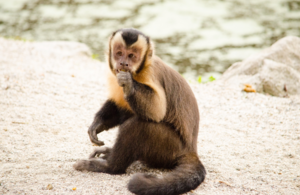Keeping primates as pets banned
It will no longer be possible to keep primates as household pets in environments that fail to provide for their needs

Measures have been signed into law today (Tuesday 5 March) to ban the keeping of primates as pets.
The legislation brings in a licensing scheme setting strict rules to ensure that only private keepers who meet new welfare and licensing standards will be able to keep primates, delivering on a manifesto commitment and Action Plan for Animal Welfare pledge to provide greater legal protection for pet primates.
The measures come into force from 6 April 2026 when all primates in England will need to be kept to these zoo-level standards - in effect banning the practice of keeping primates as pets.
It is estimated that up to 5,000 primates are currently kept in domestic settings as pets in the UK. These wild animals have complex welfare and social needs and, according to most experts, cannot be properly cared for in these environments. The new measures will improve the welfare of potentially thousands of these intelligent animals.
Animal Welfare Minister Lord Douglas-Miller said:
“We are proud to have some of the highest animal welfare standards in the world, including these new restrictions which will help tackle the inadequate conditions that some of these inquisitive creatures are kept in.
“Anyone who fails to provide the same welfare standards as found in a zoo faces a fine and having the primate removed from their care.”
RSPCA Head of Public Affairs David Bowles said:
“Meeting the needs of monkeys and other primates is practically impossible to do in a household, domestic environment.
“That’s why this legislation will be a really important moment for animal welfare – ensuring primates can only be kept in an appropriate environment, as we all strive to create a better world for every animal.
“Too often, our dedicated officers are called to properties where monkeys live in the wrong surroundings, eat totally inappropriate diets and are at risk of suffering behind closed doors. This new law has the potential to change that.”
Under the law all private primate keepers will be required to hold a licence, issued by their local authority, with failure to comply with licence conditions resulting in an unlimited fine or removal of the primate. Defra will work closely with local authorities to make sure that they have the appropriate tools and guidance to ensure that enforcement will be carried out effectively.
The new law builds on our recent consultation and flagship Action Plan for Animal Welfare, which committed us to going even further to protect animals, including banning the export of live animals with a Bill currently going through Parliament.
Since publishing the Action Plan for Animal Welfare in 2021, we have brought in new laws to recognise animal sentience; introduced tougher penalties for animal cruelty offences; extended the ivory ban to cover other ivory bearing species; and supported legislation to ban glue traps, the import of detached shark fins and measures to ban the advertising and offering for sale of low welfare activities abroad.
The UK was the first country in the world to introduce animal cruelty offences and are the highest ranked G7 nation according to the World Animal Protection’s Index.